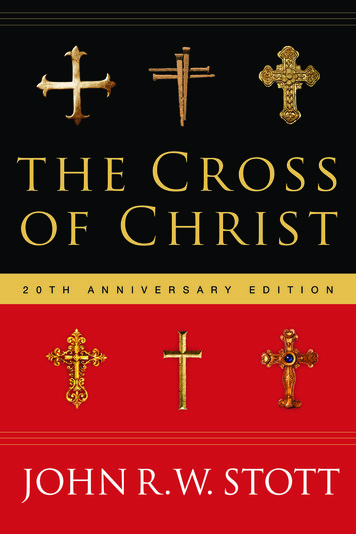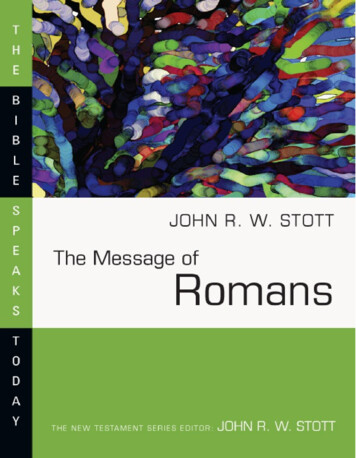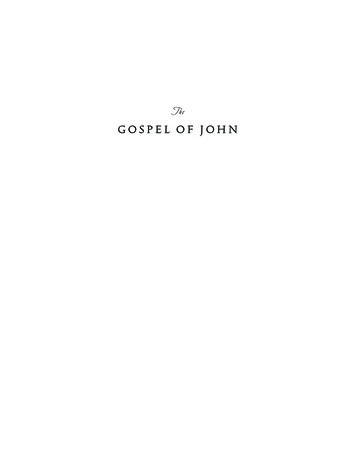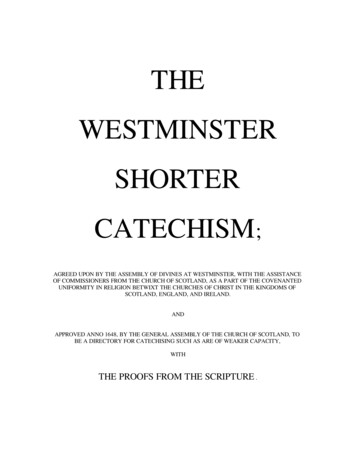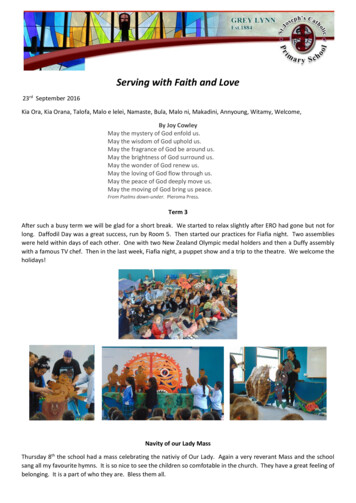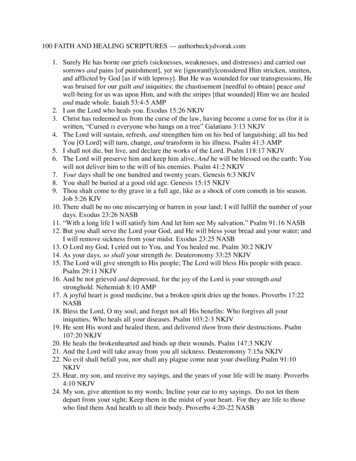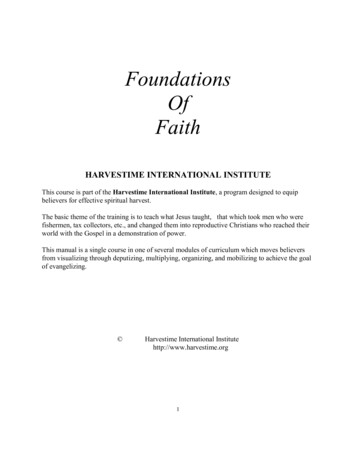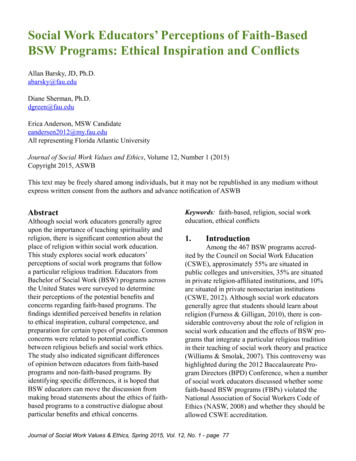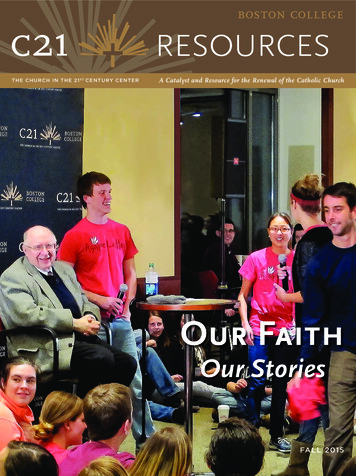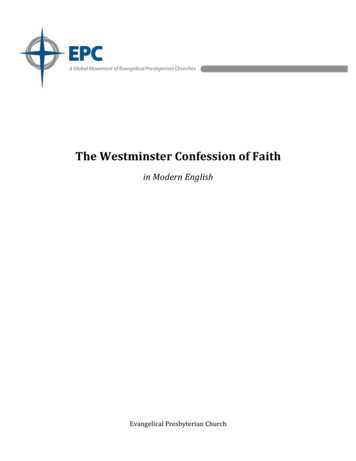
Transcription
The Westminster Confession of Faithin Modern EnglishEvangelical Presbyterian Church
Evangelical Presbyterian Church5850 T.G. Lee Blvd., Suite 510Orlando, FL 32822info@epc.orgwww.epc.orgThird Edition 201015th Printing 2017The Westminster Shorter Catechism by permission of Reformed Theological Seminary andPresbyterian and Reformed Publishing Company.Scripture taken from the HOLY BIBLE, NEW INTERNATIONAL VERSION. Copyright 1973, 1978, 1978 International Bible Society. Used by permission of Zondervan BiblePublishers.Copyright 2010 The Evangelical Presbyterian ChurchAll rights reserved. No part of this book may be reproduced without permission, except by areviewer who may quote brief passages in a review; nor may any part of this book bereproduced, stored in a retrieval system or recorded by mechanical, electronic, photocopying,or other means without permission.
ContentsPreface . iiiEssentials of Our Faith .ivExplanatory Statement to “Essentials of Our Faith” .vProof Texts .viThe Westminster Confession1. Holy Scripture .32. God and the Holy Trinity .63. God’s Eternal Decrees .84. Creation . 105. Providence . 116. The Fall of Man, Sin, and the Punishment for Sin. 137. God’s Covenant with Man . 148. Christ the Mediator . 169. Free Will . 1910. Effectual Calling . 2011. Justification . 2112. Adoption . 2313. Sanctification . 2414. Saving Faith . 2515. Repentance Leading to Life . 2616. Good Works . 2717. The Perseverance of the Saints . 2918. The Assurance of Grace and Salvation . 3019. The Law of God . 3220. Christian Freedom and Freedom of Conscience . 3421. Religious Worship and the Sabbath Day . 3622. Lawful Oaths and Vows . 3823. Civil Authorities . 4024. Marriage and Divorce . 4225. The Church . 4426. The Fellowship of the Saints . 45i
27. The Sacraments . 4628. Baptism . 4729. The Lord’s Supper . 4830. Condemnation by the Church . 5031. Synods and Councils . 5132. The Condition of Man after Death and the Resurrection of the Dead. 5233. The Last Judgment . 5334. The Holy Spirit . 5435. The Gospel of the Love of God and Missions. 55Afterword on the Textsii
PREFACEThe Constitution of the Evangelical Presbyterian Church consists of the Book of Order (comprisedof The Book of Government, The Book of Discipline, and The Book of Worship), the WestminsterConfession of Faith (including the Larger and Shorter Catechisms), and the document Essentials ofour Faith. All these documents are subordinate to the Scripture, which is “the supreme and finalauthority on all matters on which it speaks.”You have in your possession the second volume of the Constitution of the Evangelical PresbyterianChurch. On the recommendation of the Christian Education & Publication Committee, the 28thGeneral Assembly (2008) approved publishing the EPC Governing Documents in a more convenientand affordable format. What was once the loose leaf “Blue Book” will now be available as:The Constitution: Volume 1 – The Book of Order (including Rules for Assembly, Acts ofAssembly, and Forms for Discipline)The Constitution: Volume 2 – The Westminster Confession of Faith and Catechisms (InModern English)The Service Forms, which were originally part of the “Blue Book”, will be published separately inbooklet form, easily used by those presiding at the Sacraments or the ordination and installation ofofficers. A separate publication of Documents of the General Assembly is planned as a reference forchurches.Having the Westminster standards as our doctrinal foundation since our beginning in 1981, the EPCadopted the modern English edition of the Confession in 1984. Subsequently the modern EnglishShorter Catechism came into popular use in the EPC, and the 24th General Assembly (2004) approvedthe modern English Larger Catechism.According the act of the 5th General Assembly (1985), “Essentials of Our Faith” is published hereinalong with the “Explanatory Statement” added by the 22nd General Assembly (2002).Jeffrey Jeremiah, Stated ClerkOctober 2010iii
Essentials of Our FaithAll Scripture is self-attesting and being Truth, requires our unreserved submission in all areas of life.The infallible Word of God, the sixty-six books of the Old and New Testaments, is a complete andunified witness to God’s redemptive acts culminating in the incarnation of the Living Word, the LordJesus Christ. The Bible, uniquely and fully inspired by the Holy Spirit, is the supreme and finalauthority on all matters on which it speaks.On this sure foundation we affirm these additional Essentials of our faith.1. We believe in one God, the sovereign Creator and Sustainer of all things, infinitely perfect andeternally existing in three persons, Father, Son, and Holy Spirit. To Him be all honor, glory andpraise for ever!2. Jesus Christ, the living Word, became flesh through His miraculous conception by the Holy Spiritand His virgin birth. He who is true God became true man united in one Person forever. He diedon the cross a sacrifice for our sins according to the Scriptures. On the third day He arose bodilyfrom the dead, ascended into heaven, where, at the right hand of the Majesty on High, He now isour High Priest and Mediator.3. The Holy Spirit has come to glorify Christ and to apply the saving work of Christ to our hearts.He convicts us of sin and draws us to the Savior. Indwelling our hearts, He gives new life to us,empowers and imparts gifts to us for service. He instructs and guides us into all truth, and seals usfor the day of redemption.4. Being estranged from God and condemned by our sinfulness, our salvation is wholly dependentupon the work of God’s free grace. God credits His righteousness to those who put their faith inChrist alone for their salvation, and thereby justifies them in His sight. Only such as are born ofthe Holy Spirit and receive Jesus Christ become children of God and heirs of eternal life.5. The true Church is composed of all persons who through saving faith in Jesus Christ and thesanctifying work of the Holy Spirit are united together in the body of Christ. The Church findsher visible, yet imperfect, expression in local congregations where the Word of God is preachedin its purity and the sacraments are administered in their integrity, where scriptural discipline ispracticed, and where loving fellowship is maintained. For her perfecting, she awaits the return ofher Lord.6. Jesus Christ will come again to the earth–personally, visibly, and bodily–to judge the living andthe dead, and to consummate history and the eternal plan of God. “Even so, come, Lord Jesus.”(Rev. 22:20)7. The Lord Jesus Christ commands all believers to proclaim the gospel throughout the world and tomake disciples of all nations. Obedience to the Great Commission requires total commitment to“Him who loved us and gave Himself for us.” He calls us to a life of self-denying love andservice. “For we are His workmanship, created in Christ Jesus for good works, which Godprepared beforehand that we should walk in them.” (Eph. 2:10)These Essentials are set forth in greater detail in the Westminster Confession of Faith.In Essentials . UnityIn Non-Essentials . LibertyIn All Things . Charityiv
Explanatory Statement to“Essentials of Our Faith”The Westminster Confession of Faith is a confessional statement of orthodox Presbyterianism. TheWestminster Confession of Faith is our standard of doctrine as found in Scripture. It is a positivestatement of the Reformed Faith. The Westminster Confession of Faith constitutes a system ofbiblical truth that an officer of the Evangelical Presbyterian Church is required to believe,acknowledging that each individual court has the freedom to allow exceptions which do not infringeupon the system of doctrine in the Westminster Confession of Faith.“Essentials of Our Faith” is an irenic statement of historic evangelicalism. The purpose of “Essentialsof Our Faith” is to define core beliefs of the Christian Faith. It expresses historic Christian beliefscommon to all true believers and churches throughout the world. “Essentials of Our Faith” is notintended to be the exclusive test of orthodoxy for ordination. It is not intended to be used as anexplicit standard for minimal core beliefs for candidates, ordination or ministerial examinations. It isnot to be construed as a substitute for the Westminster Confession of Faith.Both the Westminster Confession of Faith and “Essentials of Our Faith” are important documents inthe Evangelical Presbyterian Church. The Westminster Confession of Faith and “Essentials of OurFaith” are not alternative statements of truth, nor are they competitive statements of truth. They eachserve important and harmonious purposes within the Evangelical Presbyterian Church. TheWestminster Confession of Faith preserves our commitment to the historic orthodoxy of theReformed Faith. “Essentials of Our Faith” preserves our commitment to historic evangelicalism.v
Proof TextsThis edition contains a composite of all the proof texts ever cited to support the positions articulatedin the British and American editions of the Westminster standards. There have been three majorversions of the proof texts for the Confession of Faith: (a) the 1647 British edition, (b) a revision bythe Presbyterian Church in the United States of America (PCUSA) in 1894, and (c) an equallyextensive revision by the Presbyterian Church in the United States (PCUS) in 1910. The two revisionshave hundreds of additions and deletions. None of the deletions are indicated in the notes here, but allof the additions are, along with the original proof texts. For the Larger Catechism of 1648, PCUSAalso did an extensive revision in 1894, which was largely followed by PCUS. The briefer proof textsfor the Shorter Catechism have basically remained the same. Scriptural references are cited by book,chapter, and verse, using abbreviations according to The Chicago Manual of Style.In its 1910 revision of the proof texts, PCUS added the following for both the Confession and LargerCatechism:General Note: At several points the Confession of Faith [or Larger Catechism] is more specificin its statements than the Scriptures. These statements are inferences drawn from the Scripturesor from statements based on the Scriptures, or from the experience and observation of theChurch. In such cases, no texts are cited, but reference is made to this General Note.The proof texts to the new, American Chapters 34 and 35 were simply grouped by sections.vi
TheWestminsterConfession ofFaith
Chapter 1Holy Scripture1. Our natural understanding and the works of creation and providence so clearly show God’sgoodness, wisdom, and power that human beings have no excuse for not believing in him.1However, these means alone cannot provide that knowledge of God and of his will which isnecessary for salvation.2 Therefore it pleased the Lord at different times and in various ways toreveal himself and to declare that this revelation contains his will for his church.3 Afterwards itpleased God to put this entire revelation into writing so that the truth might be better preservedand transmitted and that the church, confronted with the corruption of the flesh and the evilpurposes of Satan and the world, might be more securely established and comforted.4 SinceGod no longer reveals himself to his people in those earlier ways,5 Holy Scripture is absolutelyessential.61.2.3.4.5.6.Rom 2.14-15, 1.19-20, Ps 19.1-4, Rom 1.32, 2.1.1 Cor 1.21, 2.13-14, 2.9-12, Acts 4.12, Rom 10.13-14.Heb 1.1-2, Gal 1.11-12, Dt 4.12-14.Prv 22.19-21, Lk 1.3-4, Rom 15.4, Mt 4.4,7,10, Is 8.19-20, Lk 24.27, 2 Tm 3.16, 2 Pt 3.15-16.Heb 1.1-2, see General Note.2 Tm 3.15-16, 2 Pt 1.10, Lk 16.29-31, Heb 2.1-3.2. What we call Holy Scripture or the written word of God now includes all the books of the Oldand New Testaments which are:The Old JoshuaJudgesRuth1 Samuel2 Samuel1 Kings2 Kings1 Chronicles2 siastesSong of 1 Thessalonians2 Thessalonians1 Timothy2 TimothyTitusPhilemonHebrewsJames1 Peter2 Peter1 John2 John3 JohnJudeRevelationThe New Testament:MatthewMarkLukeJohnActsRomans1 Corinthians2 CorinthiansGalatians3
Holy ScriptureAll of these books are inspired by God and are the rule of faith and life.77. Lk 16.29,31, Eph 2.20, Rv 22.18-19, 2 Tm 3.16, Mt 11.27.3. The books usually called the Apocrypha are not divinely inspired and are not part of the canonof Scripture. They therefore have no authority in the church of God and are not to be valued orused as anything other than human writings.88. Lk 24.27,44, Rom 3.2, 2 Pt 1.21. The Canon of Scripture is not established by explicit passages, but by thetestimony of Jesus and his apostles; of ancient manuscripts and versions; of ancient Christian writers andchurch councils, and by the internal evidence exhibited in the separate books.4. The Bible speaks authoritatively and so deserves to be believed and obeyed. This authority doesnot depend on the testimony of any man or church but completely on God, its author, who ishimself truth. The Bible therefore is to be accepted as true, because it is the word of God.99. 2 Pt 1.19,21, 2 Tm 3.16, 1 Jn 5.9, 1 Thes 2.13, Gal 1.11-12.5. We may be influenced by the testimony of the church to value the Bible highly and reverently,and Scripture itself shows in so many ways that it is God’s word; for example, in its spiritualsubject matter, in the effectiveness of its teaching, the majesty of its style, the agreement of allits parts, its unified aim from beginning to end (to give all glory to God), the full revelation itmakes of the only way of man’s salvation, its many other incomparably outstanding features,and its complete perfection. However, we are completely persuaded and assured of theinfallible truth and divine authority of the Bible only by the inward working of the Holy Spirit,who testifies by and with the word in our hearts.1010. 1 Tm 3.15, 1 Jn 2.20,27, Jn 16.13-14, 1 Cor 2.10-12, Isa 59.21, 1 Cor 2.6-9.6. The whole purpose of God about everything pertaining to his own glory and to man’s salvation,faith, and life is either explicitly stated in the Bible or may be deduced as inevitably andlogically following from it.11 Nothing is at any time to be added to the Bible, either from newrevelations of the Spirit or from traditions of men.12 Nevertheless we do recognize that theinward illumination of the Spirit of God is necessary for a saving understanding of the thingswhich are revealed in the word.13 We also recognize that some provisions for the worship ofGod and the government of the church are similar to secular activities and organizations; theseare to be directed according to our natural understanding and our Christian discretion andshould conform to the general rules of the word, which are always to be observed.1411.12.13.14.Mk 7.5-7.2 Tm 3.15-17, Gal 1.8-9, 2 Thes 2.2. This statement is an inference from the sufficiency of the Scriptures.Jn 6.45, 1 Cor 2.9-10, 12.1 Cor 11.13-14, 14.26,40.7. The meanings of all the passages in the Bible are not equally obvious, nor is any individualpassage equally clear to everyone.15 However, everything which we have to know, believe, andobserve in order to be saved is so clearly presented and revealed somewhere in the Bible thatthe uneducated as well as the educated can sufficiently understand it by the proper use of theordinary means of grace.1615. 2 Pt 3.16, Jn 6.60, 16.17.16. Ps 119.105, 130, Acts 17.11-12.4
Holy Scripture8. The Old Testament in Hebrew (the native language of the ancient people of God) and the NewTestament in Greek (the language most widely known internationally at the time the NewTestament was written) were directly inspired by God17 and have been kept uncontaminatedthroughout time by his special care and providence. They are therefore authentic and are to bethe church’s ultimate source of appeal in every religious controversy.18 The original languagesof the Bible, however, are not understood by all of God’s people. But all of God’s people havea right to an interest in the Bible and God himself commands them to read it thoroughly withawe and reverence for him.19 Consequently the Bible should be translated into the nativelanguage of every people to whom it is introduced. Then, the word of God will live fully ineveryone; everyone will be able to worship God in an acceptable way; and all believers mayhave hope through the endurance and the encouragement of the Bible.2017.18.19.20.See note under Section 3 above.Mt 5.18, Is 8.20, Acts 15.14-18, Jn 5.9,46.Jn 5.39, 2 Tm 3.14-15, 2 Pt 1.19, Acts 17.11.1 Cor 14.6, 9, 11-12, 24, 27-28, Col 3.16, Rom 15.4, Mt 28.19-20.9. The infallible standard for the interpretation of the Bible is the Bible itself. And so any questionabout the true and complete sense of a passage in the Bible (which is a unified whole) can beanswered by referring to other passages which speak more plainly.2121. 2 Pt 1.20-21, Acts 15.15, Jn 5.46, Mt 4.5-7, 12.1-7.10. The Holy Spirit speaking in the Bible is the supreme judge of all religious controversies, alldecisions of religious councils, all the opinions of ancient writers, all human teachings, andevery private opinion.22 We are to be satisfied with the judgment of him who is and can be theonly judge.22. Mt 22.29,31, Eph 2.20, Acts 28.25, Lk 10.26, Gal 1.10, 1 Jn 4.1-6.5
Chapter 2God and the Holy Trinity1. There is only one living and true God,1 who is infinite in being and perfection,2 a completelypure spirit,3 invisible,4 without body, parts, or emotions,5 unchangeable,6 immensely vast,7eternal,8 limitless,9 almighty,10 completely wise,11 completely holy,12 completely free,13 andcompletely absolute.14 He works everything according to the purpose of his own unchangeableand completely righteous will15 for his own glory.16 He is completely loving,17 gracious,merciful, and long-suffering. He overflows with goodness and truth. He forgives wickedness,transgression, and sin, 18 and rewards those who diligently seek him.19 His judgments arecompletely just and awesome; 20 he hates all sin21 and will not acquit the .18.19.20.21.22.Dt 6.4, 1 Cor 8.4,6, 1 Thes 1.9, Jer 10.10Jb 11.7-9, 26.14, Jer 23.24, Ps 147.5, 1 Kgs 8.27, Ps 139.Jn 4.24.1 Tm 1.17.Dt 4.15-16, Jn 4.24, Lk 24.39, Acts 14.11,15.Jas 1.17, Mal 3.6.1 Kgs 8.27, Jer 23.23-24.Ps 90.2, 1 Tm 1.17.Ps 145.3, Rom 11.33.Gn 17.1, Rv 4.8.Rom 16.27.Is 6.3, Rv 4.8.Ps 115.3.Ex 3.14, Is 44.6, Acts 17.24-25.Eph 1.11.Prv 16.4, Rom 11.36, Rv 4.11.1 Jn 4.8-10, 16, Jn 3.16.Ex 34.6-7.Heb 11.6.Neh 9.32-33, Heb 10.28-31.Ps 5.5-6, Heb 1.13.Na 1.2-3, Ex 34.7.2. God has all life, glory, goodness, and blessedness in and of himself.23 He alone is all-sufficientin and unto himself, nor does he need any of his creations or derive any glory from them.Rather, he manifests his own glory in, by, unto, and on them.24 He is the only source of allbeing, by whom, through whom, and to whom everything exists.25 He has completely sovereigndominion over all things and does with, to, or for them whatever he pleases.26 Everything isrevealed and completely open to him.27 His knowledge is infinite, infallible, and does notdepend on any created being,28 so that to him nothing is conditional or uncertain.29 He iscompletely holy in all his purposes, works, and commands.30 To him is due whatever worship,service, or obedience he is pleased to require from angels, human beings, and all othercreatures.3123.24.25.26.27.28.29.30.31.Jn 5.26, Acts 7.2, Ps 119.68, 1 Tm 6.15, Rom 9.5.Acts 17.24-25, Jb 22.2,23, Ps 50.12, Is 4.12-17.Rom 11.36, Is 40.12-17.Rv 4.11, 1 Tm 6.15, Dn 4.25, 35, Eph 1.11.Heb 4.13.Rom 11.33-34, Ps 147.5.Acts 15.18, Ez 11.5, Is 46.9-11, Prv 15.3.Ps 145.17, Rom 7.12.Rv 5.12-14, 7.11-12.6
God and the Holy Trinity3. In the unity of the Godhead there are three persons, having one substance, power, and eternity:God the Father, God the Son, and God the Holy Spirit.32 The Father exists. He is not generatedand does not come from any source. The Son is eternally generated from the Father, 33 and theHoly Spirit eternally comes from the Father and the Son.3432. 1 Jn 5.7, Mt 3.16-17, 28.19, 2 Cor 13.14, Eph 2.18.33. Jn 1.14,18, 17.24, Heb 1.2-6, Col 1.15-17.34. Jn 15.26, Gal 4.6.7
Chapter 3God’s Eternal Decrees1. From all eternity and by the completely wise and holy purpose of his own will, God has freelyand unchangeably ordained whatever happens.1 This ordainment does not mean, however, thatGod is the author of sin (he is not), 2 that he represses the will of his created beings, or that hetakes away the freedom or contingency of secondary causes. Rather, the will of created beingsand the freedom and contingency of secondary causes are established by him.31. Eph 1.11, Rom 11.33, Heb 6.17, Rom 9.15,18, Acts 4.27-28, Mt 10.29-30, Eph 2.10, Is 45.6-7.2. Jas 1.13-14, 17, 1 Jn 1.5, Eccl 7.29, Ps 5.4.3. Acts 2.23, Mt 17.12, Acts 4.27-28, Jn 19.11, Prv 16.33, Acts 27.23-24, 34, 44.2. Although God knows whatever may or can happen under all possible circumstances, 4 he hasnot ordered anything because he foresaw it in the future as something which would happenunder such circumstances.54. Acts 15.18, 1 Sm 23.11-12, Mt 11.21,23, Ps 139.1-4, Prv 16.33.5. Rom 9.11,13, 15-16, 18, 2 Tm 1.9, Eph 1.4-5.3. In order to manifest his glory God has ordered that some men and angels should be predestinedto everlasting life6 and that others should be foreordained to everlasting death.76. 1 Tm 5.21, Mt 25.31,41, Acts 13.48, Rom 8.29-30, Jn 10.27-29, Mk 8.38, Jude 6.7. Rom 9.22-23, Eph 1.5-6, Prv 16.4, Mt 25.41, Jude 4.4. This predestination and foreordination of angels and men are precise and unchangeable. Thenumber and identity of angels and men in each group are certain, definite, and unalterable.88. 2 Tm 2.19, Jn 13.18, 10.14-16,27-29, 6.37-39, Acts 13.48, Jn 17.2,6,9-12.5. Before the creation of the world, 9 according to his eternal, unchangeable plan10 and the hiddenpurpose and good pleasure of his will, 11 God has chosen in Christ12 those of mankind who arepredestined to life and to everlasting glory.13 He has done this solely out of his own mercy andlove and completely to the praise of his wonderful grace.14 This choice was completelyindependent of his foreknowledge of how his created beings would be or act. Neither their faithnor good works nor perseverance had any part in influencing his selection.159.10.11.12.13.14.15.Eph 1.4.Eph 1.11.Eph 1.9.2 Tm 1.9.Rom 8.30, 1 Thes 5.9, 1 Pt 5.10.Eph 1.5-6, 12.Rom 9.11, 13, 15-16, Eph 1.4,6,9, 2 Tm 1.9, Eph 2.8-9.8
God’s Eternal Decrees6. Just as God has determined that the elect shall be glorified, so, too, in the eternal andcompletely free purpose of his will he has foreordained all the means by which that election isaccomplished.16 And so, those who are chosen, having fallen in Adam, are redeemed byChrist.17 They are effectually called to faith in Christ by his Spirit working in them at the righttime,18 and they are justified,19 adopted,20 sanctified,21 and kept by his power through faith untosalvation.22 Only the elect, and no others, are redeemed by Christ, effectually called, justified,adopted, sanctified, and saved.2316.17.18.19.20.21.22.23.1 Pt 1.2, Eph 1.4-5, 2.10, 2 Thes 2.13.1 Thes 5.9-10, Ti 2.14, Rom 5.19.Rom 9.11, 2 Thes 2.13-14, 1 Cor 1.9.Rom 8.30.Eph 1.5.2 Thes 2.13, Eph 1.4, 1 Thes 4.3.1 Pt 1.5, Jn 10.28.Jn 17.9, Rom 8.28-39, Jn 6.64-65, 8.47, 10.26, 1 Jn 2.19, Acts 13.48.7. According to the hidden purpose of his own will, by which he offers or withholds mercy at hispleasure, and for the glory of his sovereign power over his creatures, it pleased God not to callthe rest of mankind24 and to ordain them to dishonor and wrath for their sin25 to the praise of hisglorious justice.2624. Mt 11.25-26, 1 Pt 2.8.25. Rom 9.14-22, Jude 4, Rom 2.8-9, 2 Thes 2.10-12.26. 2 Tm 2.19-20, Rv 15.3-4.8. This important and mysterious doctrine of predestination must be treated with special discretionand care, so that, paying attention to and obeying the will of God revealed in his word, menmay be assured that they have been eternally chosen from the certainty of their effectualcalling. In this way the doctrine of predestination will elicit not only our praise, reverence, andadmiration for God, but also a humble and diligent life, fully supporting everyone whosincerely obeys the gospel.2727. Rom 9.20, 11.33, Dt 29.29, 2 Pt 1.10, Eph 1.6, Rom 11.5-6, 20, 8.33, Lk 10.20, see General Note.9
Chapter 4Creation1. In the beginning it pleased God the Father, Son, and Holy Spirit 1 to create the world out ofnothing in order to reveal the glory of his eternal power, wisdom, and goodness.2 He madeeverything in the world, visible and invisible, in the space of six days, and it was very good.31. Heb 1.2, Jn 1.2-3, Gn 1.1-3, Jb 26.13, 33.4, Rom 11.36, 1 Cor 8.6.2. Rom 1.20, Jer 10.12, Ps 104.24, 33.5-6.3. Gn 1, Heb 11.3, Col 1.16, Acts 17.24, Ex 20.11.2. After God had made all the other creatures, he created man, male and female,4 with reasoning,immortal souls.5 He endowed them with knowledge, righteousness, and true holiness in his ownimage6 and wrote his law in their hearts.7 God also gave them the ability to obey his law and thepotential to disobey it; i.e., he gave them freedom of their own will, which could change.8 Inaddition to this law written in their hearts, they were commanded not to eat from the Tree of theKnowledge of Good and Evil.9 As long as they obeyed God’s law and kept this commandment,they were happy in fe
The briefer proof texts for the Shorter Catechism have basically remained the same. Scriptural references are cited by book, chapter, and verse, using abbreviations according to The Chicago Manual of Style. In its 1910 revision of the proof texts, PCUS added th

